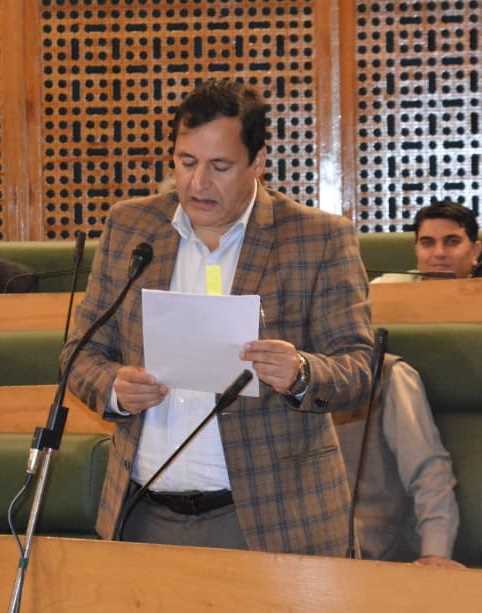
Minister for Agriculture Production Department, Javid Ahmad Dar, informed the Legislative Assembly on Wednesday that a total of 15,51,863 fruit plants were imported to Jammu and Kashmir by empanelled agencies over the last two years.
Replying to a question raised by MLA Shabir Ahmad Kullay, the Minister said that the majority of these imports comprised apple varieties such as Gala, Red Delicious, and their improved strains. In addition to apples, limited quantities of walnut plants, cherry plants, and apple rootstock were also brought in.
Dar highlighted that pest attacks, particularly from the Leaf Miner, have increased over the past two to three years due to changing climatic conditions. There has also been a resurgence of aphid infestations in several parts of the Kashmir Valley.
To tackle the issue, the Department of Horticulture, in collaboration with SKUAST-Kashmir, has intensified field surveillance, pest monitoring, and Integrated Pest Management (IPM) interventions. Regular awareness and capacity-building programmes are also being held to strengthen community participation in pest control.
The Minister clarified that large-scale drone spraying of insecticides is not recommended by research institutions due to environmental concerns, fragmented land holdings, and risks to non-target organisms. Instead, the government follows advisories issued by SKUAST-K, CITH, and ICAR, focusing on sustainable and community-based IPM strategies.
Dar further informed that the government is taking concerted steps to strengthen the local nursery sector under the Holistic Agriculture Development Programme (HADP) and the Jammu & Kashmir Competitiveness Improvement Project (JKCIP). Financial and subsidy support is being extended for establishing Mother Orchards, Rootstock Banks, and Plant Propagation Units across districts to promote indigenous production of quality planting material.
He added that the department has fixed district-wise targets for the supply of high-density planting material under schemes like HADP, Revised Modified High-Density Plantation Scheme (RMHDPS), and JKCIP, with an ambitious plan to cover 5,500 hectares under high-density plantation across Jammu and Kashmir over the next ten years, subject to resource availability.
Minister for Agriculture Production Department, Javid Ahmad Dar, informed the Legislative Assembly on Wednesday that a total of 15,51,863 fruit plants were imported to Jammu and Kashmir by empanelled agencies over the last two years.
Replying to a question raised by MLA Shabir Ahmad Kullay, the Minister said that the majority of these imports comprised apple varieties such as Gala, Red Delicious, and their improved strains. In addition to apples, limited quantities of walnut plants, cherry plants, and apple rootstock were also brought in.
Dar highlighted that pest attacks, particularly from the Leaf Miner, have increased over the past two to three years due to changing climatic conditions. There has also been a resurgence of aphid infestations in several parts of the Kashmir Valley.
To tackle the issue, the Department of Horticulture, in collaboration with SKUAST-Kashmir, has intensified field surveillance, pest monitoring, and Integrated Pest Management (IPM) interventions. Regular awareness and capacity-building programmes are also being held to strengthen community participation in pest control.
The Minister clarified that large-scale drone spraying of insecticides is not recommended by research institutions due to environmental concerns, fragmented land holdings, and risks to non-target organisms. Instead, the government follows advisories issued by SKUAST-K, CITH, and ICAR, focusing on sustainable and community-based IPM strategies.
Dar further informed that the government is taking concerted steps to strengthen the local nursery sector under the Holistic Agriculture Development Programme (HADP) and the Jammu & Kashmir Competitiveness Improvement Project (JKCIP). Financial and subsidy support is being extended for establishing Mother Orchards, Rootstock Banks, and Plant Propagation Units across districts to promote indigenous production of quality planting material.
He added that the department has fixed district-wise targets for the supply of high-density planting material under schemes like HADP, Revised Modified High-Density Plantation Scheme (RMHDPS), and JKCIP, with an ambitious plan to cover 5,500 hectares under high-density plantation across Jammu and Kashmir over the next ten years, subject to resource availability.
© Copyright 2023 brighterkashmir.com All Rights Reserved. Quantum Technologies